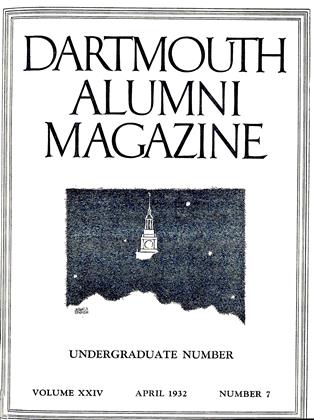By Charles Edward Crane '06. Brattleboro, Vt., Stephen Daye Press, 1931. pp. 206.
This charming little volume of two hundred pages is to be commended to everyone in his half-hours of leisure. The informal essays it contains are none of them so long as to require much time for reading, but I warn you against picking them up when you are in a hurry to be about your mundane tasks, for they start you off on your path of dreamsto almost anywhere. They go well with a pipe in your fireside chair after dinner, and they are quite perfect for the bedside table in your guest room.
Selected from the column Mr. Crane conducted for eight years in the Brattleboro Reformer, the essays cover the widest variety of subjects. In general, their background is Vermont;—Vermont hills and streams, Vermont houses, Vermont customs, Vermont people—but now and then they stray, as their author has done, around the world. They lead you into Little Averill Lake to fish for landlocked salmon; up the Long Trail to help build Sucker Brook Lodge; into the Pisgah Forest to admire immemorial pines and ephemeral mushrooms; out with the children to gather the earliest hepaticas; and down the streets of Brattleboro to wonder at octagonal domestic architecture. They make you acquainted with the three lively Crane children and—oh, so well—with the Crane family cat and her literary bent. You lend your moral support to the Pendrifter as he struggles with his furnace and his typewriter, his snowshovel and his paste-pot.
Bat around and in between these adventures you come face to face with famous men and celebrated events. You see Calvin Coolidge, in quiet Plymouth and in official Washington; you visit Dorothy Canfield Fisher in her picturesque home at Arlington, and you buy eggs with Sinclair Lewis in Barnard. Kipling lives again at Brattleboro for you, and you learn much of his life there that you have never known before. You follow the peddler parades of Jim Fisk's father through Vermont in 1857, and you see a "spirit-pen" complete The Mystery of EdwinBrood in Brattleboro in 1873. You hear how the great news story of the sinking of the Titanic broke at Associated Press headquarters in 1912, and you come closer to the Vermont flood than you have ever done before, unless you chanced yourself to be in Vermont in 1927. And so on and on.
What delights you most, however, throughout the book is the genial personality of the author. You feel—if you don't know Charlie Crane already—that you have found a valued friend, whose quiet Yankee humor and homely philosophy win your completest trust. His kindly human interest, not untouched with that bit of sentimentality that lies hidden in even the most austere of us, is all-inclusive. And so I end as I began, by commending "Pen-Drift" to every leisurely reader.
 View Full Issue
View Full Issue
More From This Issue
-
 Article
ArticleAn Undergraduate Looks at His College
April 1932 By Howland H. Sargeant '32 -
 Article
Article"Wildcatter"—A Play in One Act
April 1932 By James W. Riley '32 -
 Class Notes
Class NotesCLASS OF 1910
April 1932 By Harold P. Hinman -
 Class Notes
Class NotesCLASS OF 1928
April 1932 By Leroy C. Milliken -
 Class Notes
Class NotesCLASS OF 1926
April 1932 By J. Branton Wallace -
 Article
ArticleThe Value of Fraternities to the College
April 1932 By Robert Coltman '32
F. L. Childs
Books
-
 Books
BooksShelflife
Nov/Dec 2009 -
 Books
BooksThe Good Life
SEPTEMBER 1983 By Edward M. Holmes '33 -
 Books
BooksTHE STRUCTURE OF MATTER.
DECEMBER 1965 By FRANCIS W. SEARS -
 Books
BooksPETER HARRISON, FIRST AMERICAN ARCHITECT
July 1949 By Hugh Morrison '26 -
 Books
BooksALUMNI PUBLICATIONS
April 1921 By K.A.R. -
 Books
BooksMARKETING IN AN UNDERDEVELOPED ECONOMY: THE NORTH INDIAN SUGAR INDUSTRY.
JULY 1963 By KENNETH R. DAVIS






